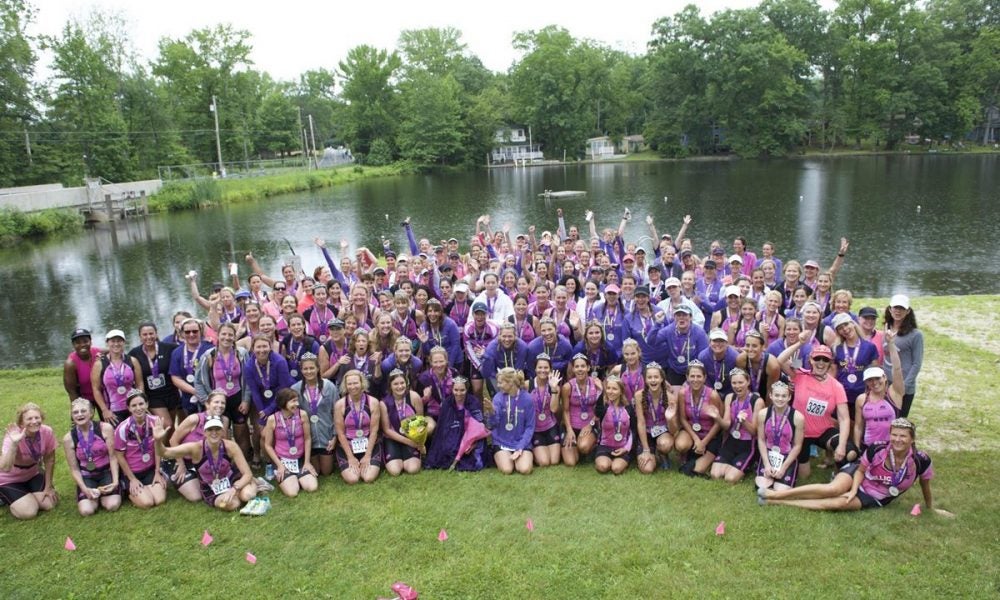Meet the Fastest Growing Tri Team in the U.S.

Photo: <a href=http://Mullicahilltriclub.com>Mullicahilltriclub.com</a>
Nine years ago, four women in New Jersey thought it would be nice to have some people to train with. Today, the Mullica Hill Women’s Tri Club has 700 members. Here, a founder shares the secrets to the club’s success.
A business plan is a beautiful thing, but that’s not what started, powered, or kept up the momentum of the Mullica Hill Women’s Tri Club. Passion, mom-power, and word-of-mouth were key ingredients. Fresh off great experiences at the Philadelphia SheROX tri in 2009, four women tossed around the idea of creating a team to train with for this all-female triathlon, says co-founder Michelle Powell.
“We thought we’d get a little group together at a coffee shop and talk about it,” she says. Invitations went out by email to friends and friends of friends, “and word spread over the soccer fields and through schools—wherever women were coming in contact with each other.” More than 75 women showed up—with only social media as a marketing tool (that’s still true with the club). They expect more than 400 women at this year’s kickoff meeting on Feb. 27.
Powell credits the tight-knit community they live in as a key driver for the growth of this grass-roots effort. The enthusiasm was contagious in these friend networks, and a big factor that keeps so many women on the team, she believes, is the non-intimidating, supportive nature of the group. Haven’t worked out for years? No big. “We have that ‘If I can do it, you can do it and we can do it together’ spirit,” Powell says.
Their six workouts a week cater to all levels of athletes, and members can find their tribe-within-a-tribe through their well-trafficked private online community. But the secret Miracle-Gro of the club is more likely the social side of things. The team makes special effort to foster the group spirit and stack the season with events where people can enjoy their fitness and each other, not just focus on training. For instance, some bike rides start and finish at a local public golf course that has a restaurant where people can socialize afterward. One of the group’s signature events is Ride the Farm, which features not only a farmstand-to-farmstand route, but also is staffed with volunteers who take riders’ purchases back to the start/finish line for them. The team hosts open-water swims with childcare (for a small fee). They now host their own triathlon (Powell is the race director), Queen of the Hill, that’s done entirely in their community; last year’s race had nearly 200 competitors—“probably about 80% club members,” she says.
Not to be discounted in its success is the price: $50 per year, which includes a team T. Do-good appeal is likely part of it, too; every year, the team raises money for a different charity.
None of the founders has ever done this solely as her full-time job. “We each probably spent about 15 to 20 hours a week on it in the beginning,” Powell says. “I was a stay-at-home mom and worked part time at a local college in marketing, so I’d get as much done as I could during the day when the kids were at school.”
With growth comes growing pains, so the founders formed a 501(c)(3) a few years ago. “We have officers and people in specific roles, and that’s really helping a great deal in terms of determining how we’re going to spend some of our funds, or working through some differences in opinion,” Powell says.
In the next nine years, Powell says she’d love to help women in other communities start similar clubs (“they don’t have to be big. Whether you get five or 50 women, it’s still going to be a great experience”). Her tips to them: “Have a can-do attitude and a lot of persistence. When I first talked about doing this triathlon in Mulligan Hill, I received so much resistance. But I just kept answering the questions and providing the information and showing that we were willing to work together as a community. It’s about establishing relationships.”
Powell has said that triathlons taught her that she’s capable of doing so much more in life than she thought possible. She’s still pretty amazed that she directs a race and that she helped build a team of this magnitude. But when you’re committed to an idea, she says, “you just figure it out.”